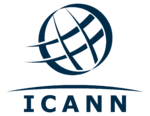ICANN 03: Difference between revisions
No edit summary |
|||
| Line 14: | Line 14: | ||
The board took further steps in the creation of the [[Uniform Dispute Resolution Policy]], approving the implementation of such a policy and offering the following guidance: | The board took further steps in the creation of the [[Uniform Dispute Resolution Policy]], approving the implementation of such a policy and offering the following guidance: | ||
<blockquote>1. The registrars' Model Dispute Resolution Policy should be used as a starting point; | <blockquote>1. The registrars' Model Dispute Resolution Policy should be used as a starting point; <br /> | ||
2. The President or his delegate should convene a small drafting committee including persons selected by him to express views and consider the interests of the registrar, non-commercial, individual, intellectual property, and business interests; | 2. The President or his delegate should convene a small drafting committee including persons selected by him to express views and consider the interests of the registrar, non-commercial, individual, intellectual property, and business interests; <br /> | ||
3. In addition to the factors mentioned in paragraph 171(2) of the WIPO report, the following should be considered in determining whether a domain name was registered in bad faith:<br /> | 3. In addition to the factors mentioned in paragraph 171(2) of the WIPO report, the following should be considered in determining whether a domain name was registered in bad faith:<br /> | ||
(a) Whether the domain name holder is making a legitimate noncommercial or fair use of the mark, without intent to misleadingly divert consumers for commercial gain or to tarnish the mark;<br /> | (a) Whether the domain name holder is making a legitimate noncommercial or fair use of the mark, without intent to misleadingly divert consumers for commercial gain or to tarnish the mark;<br /> | ||
(b) Whether the domain name holder (including individuals, businesses, and other organizations) is commonly known by the domain name, even if the holder has acquired no trademark or service mark rights; and <br /> | (b) Whether the domain name holder (including individuals, businesses, and other organizations) is commonly known by the domain name, even if the holder has acquired no trademark or service mark rights; and <br /> | ||
(c) Whether, in seeking payment for transfer of the domain name, the domain name holder has limited its request for payment to its out-of-pocket costs. | (c) Whether, in seeking payment for transfer of the domain name, the domain name holder has limited its request for payment to its out-of-pocket costs. <br /> | ||
4. There should be a general parity between the appeal rights of complainants and domain name holders; and | 4. There should be a general parity between the appeal rights of complainants and domain name holders; and<br /> | ||
5. The dispute policy should seek to define and minimize reverse domain name hijacking.<ref name="resos">[https://archive.icann.org/en/meetings/santiago/santiago-resolutions.htm ICANN 3 Archive - Board Resolutions from the Santiago Meeting], August 26, 1999</ref></blockquote> | 5. The dispute policy should seek to define and minimize reverse domain name hijacking.<ref name="resos">[https://archive.icann.org/en/meetings/santiago/santiago-resolutions.htm ICANN 3 Archive - Board Resolutions from the Santiago Meeting], August 26, 1999</ref></blockquote> | ||
Revision as of 20:23, 1 September 2021
 | |
| Dates: | August 23-26, 2009 |
| Location: | Santiago, Chile |
| Website: | ICANN 3 |
| Historical Significance | |
| Board approves the implementation of the UDRP | |
ICANN 3 was held in Santiago, Chile, in August 1999. The meeting followed the same structure as previous meetings, and many of the sessions were broadcast over the Internet. All meetings were held at the College of Economic Sciences of the University of Chile [1]. Webcasting and scribing services were provided by the Berkman Center for Internet and Society.[2]
UDRP[edit | edit source]
The board took further steps in the creation of the Uniform Dispute Resolution Policy, approving the implementation of such a policy and offering the following guidance:
1. The registrars' Model Dispute Resolution Policy should be used as a starting point;
2. The President or his delegate should convene a small drafting committee including persons selected by him to express views and consider the interests of the registrar, non-commercial, individual, intellectual property, and business interests;
3. In addition to the factors mentioned in paragraph 171(2) of the WIPO report, the following should be considered in determining whether a domain name was registered in bad faith:
(a) Whether the domain name holder is making a legitimate noncommercial or fair use of the mark, without intent to misleadingly divert consumers for commercial gain or to tarnish the mark;
(b) Whether the domain name holder (including individuals, businesses, and other organizations) is commonly known by the domain name, even if the holder has acquired no trademark or service mark rights; and
(c) Whether, in seeking payment for transfer of the domain name, the domain name holder has limited its request for payment to its out-of-pocket costs.
4. There should be a general parity between the appeal rights of complainants and domain name holders; and
5. The dispute policy should seek to define and minimize reverse domain name hijacking.[3]
Historical Notes[edit | edit source]
- The Board of directors at the time of ICANN 3 were as follows: Esther Dyson (Interim Chairman), Geraldine Capdeboscq, George Conrades, Greg Crew, Frank Fitzsimmons,Hans Kraaijenbrink, Jun Murai, Michael Roberts,Eugenio Triana, and Linda S. Wilson.
- Mike Roberts was the SEO of ICANN at the time of ICANN 3
